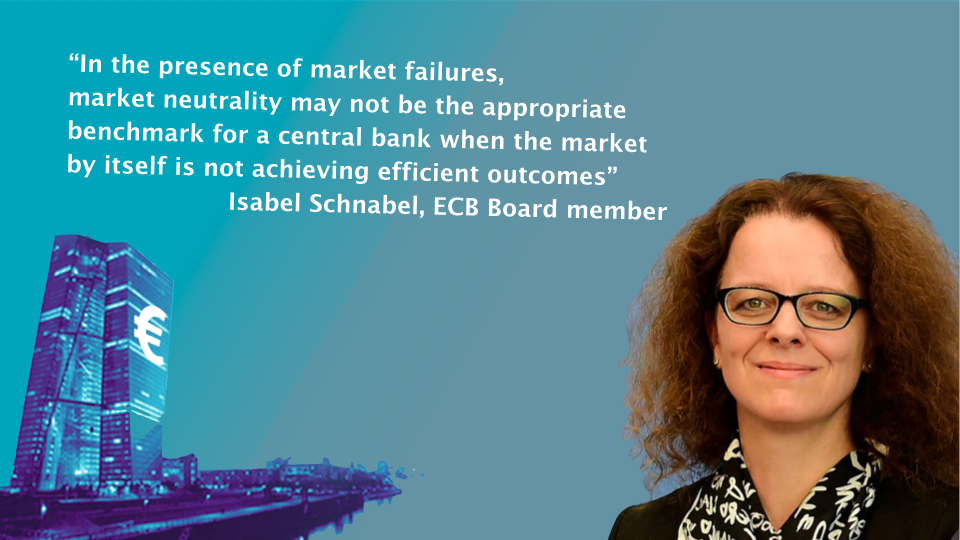Once upon a time, market neutrality was supposed to be an untouchable holy principle of the ECB’s quantitative easing, but today the ECB has finally made loud and clear this principle should be reviewed.
Nicolas Hercelin contributed to this article
Not such a long time ago, the idea that central banks should play a role in tackling climate change was not even a taboo, it was simply unthinkable.
For the past four years, Positive Money Europe has been regularly challenging the ECB’s responsibility for climate change. While divestment from oil and coal is urgently needed, numerous research from Positive Money Europe and other NGOs such as Greenpeace have demonstrated that the ECB is de facto a big subsidiser of highly polluting companies.
But we were quickly countered that when conducting asset purchases, the central bank had no other choice but to apply the “market neutrality” principle.
In practice, “market neutrality” means central banks should not be selective when conducting open market operations. Instead, they should make sure that the amount of each security they purchase perfectly mirrors their market size. In other words, if the market has a preference for highly polluting securities, the ECB must proportionally reflect this preference in its asset purchases.
As Benoit Coeuré, a former board member of the ECB, once said “in the framework of our current policy, we are neutral regarding the market’s structure which leads us to buy bonds from corporations whose carbon footprint is not good”.
While acknowledging the problem, central bankers used to point out this was an unfortunate, but unavoidable consequence, because there was no other way around than respecting the market neutrality principle. The German central banker Jens Weidmann even claimed market neutrality is “anchored in Article 127 of the EU Treaty”.
Thankfully, Positive Money Europe did not give in to old-fashioned central bank ideology. As pointed out by many academics, to a large extent market neutrality is a myth which contradicts other parts of the ECB’s mandate and legal requirement to support the Paris agreement objectives.
One year ago, we published an article summarising our research: nowhere does the European Treaty establish market neutrality as a legal requirement. Instead, we pointed out that market neutrality is not a legal requirement for the ECB, but nothing else than a self-imposed doctrine. If the ECB decided to be market neutral, it can certainly choose to not be so.
One year later, we are glad to report that our argument seems to have hit the target, with several top-level ECB decision-makers publicly acknowledging the validity of our analysis. It started with ECB Board member Isabel Schnabel eloquently saying in a remarkable speech :
“In the presence of market failures, market neutrality may not be the appropriate benchmark for a central bank when the market by itself is not achieving efficient outcomes”
A statement which was quickly echoed by Christine Lagarde during a UNEP Finance Initiative conference:
“It is also a question that we have to ask ourselves: as to whether market neutrality should be the actual principle that drives our monetary policy portfolio management, asset purchase programme. I’m not passing a judgement on the fact that this should no longer be so. But it warrants the question. And this is something that we are going to do as part of our strategy review. And I think that all central bankers will have to ask themselves the question as to whether or not we are not taking excessive risks by simply trusting mechanisms that have not priced in the massive risk that is out there and that results from the impact of our action, us human beings, on our planet and how we impact the life of future generations through not fighting climate change.”
Christine @Lagarde asks all central bankers to think about whether or not we are taking an excessive risk by simply trusting mechanisms that have not priced in climate change.
Here’s why the ECB should go beyond market neutrality 👉 https://t.co/cCz3KCtKQq #ECB pic.twitter.com/r8DilizZbC
— Positive Money Europe (@PositiveMoneyEU) October 20, 2020
On all counts, Schnabel and Lagarde are both acknowledging that Positive Money Europe was right to denounce the strict application of market neutrality, and we’re very much welcoming this.
But we haven’t won the battle yet, as 23 other members of the Governing Council will ultimately be deciding on the future course of the ECB’s monetary policy, including on whether the ECB should green its policies and move beyond market neutrality.
The next step in the debate will be around what kind of another benchmark could the ECB operate its purchases? Clearly, the EU taxonomy of sustainable assets which will be implemented in 2022 would be a strong candidate for becoming such a guiding benchmark, and the ECB prepares for using it as soon as possible.

